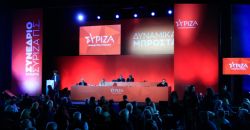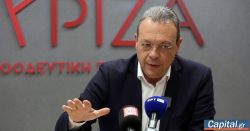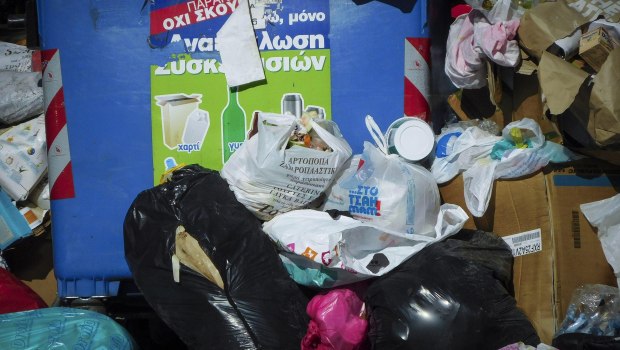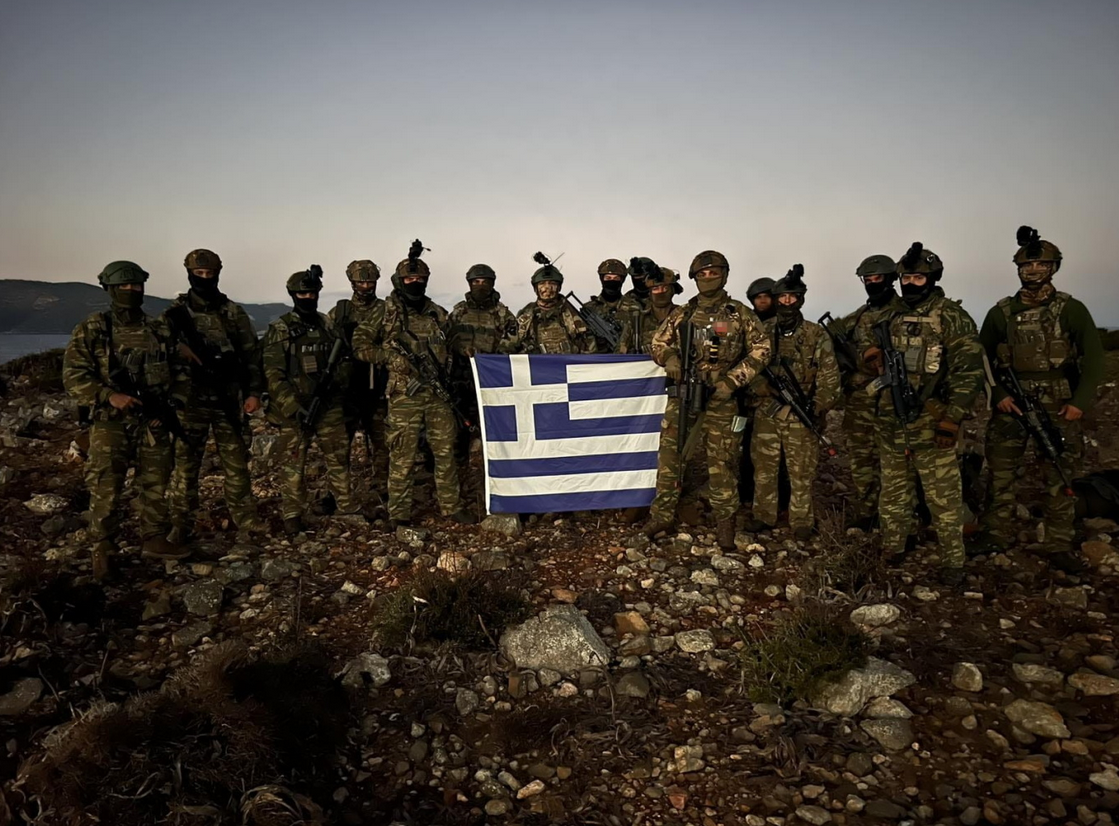K.M.’s investment breakfast with the 25 funds, Prokopis, Karachalios, Loulis and…the rest
Source: ProtoThema English
Hello, I watched the other night Kyriakos Mitsotakis’ TV interview with the Wall Street Journal, in which he spoke for quite a while about everything the American journalist asked him. To be honest, I didn’t see a politician who is collapsing—generally, or specifically because of the cancellation of his meeting with Erdogan. After all, as you can see, Erdogan has his own issues (he did the same with Meloni), and he tends to flare up with everyone and everything—including, of course, our “planetarch.” But of course, there’s a difference between POTUS, the leader of the planet, and the local dictator of the region. In any case, we’ll see whether this “non-meeting” will stir up the calm waters and make them murky—to borrow the (nice) headline of Kathimerini yesterday. But how else can I put it? Watch Mitsotakis speak and behave, even when things aren’t going entirely his way (c’est la vie, as he himself said), and compare him with the alternative… Nikos A. of PASOK, the “I’m ready” guy, or whomever else you want. Then go to sleep calmly about what tomorrow may bring. Now, you might say: what’s going to happen—will we enter an era of “Karamanlis or tanks,” but this time as “Mitsotakis or chaos”? The truth is, no one knows. Anyway, I think we’ve got a long road ahead until the end—which is, of course, the elections.
10 trillion with Mitsotakis at the Aman
A big investment breakfast, with K.M. at the center and 25 representatives of major American companies, funds, banks, and insurance institutions, was held yesterday at the Aman Hotel in New York. The names—and especially the value of assets managed by these players—are truly huge. In total, we’re talking about roughly $10 trillion (!) in assets. The discussion included new players as well as very senior executives of organizations already known to the government. Here’s the list: Capital Group, with assets worth about $3.3 trillion; JP Morgan Asset Management, $3.7 trillion; Morgan Stanley Investment Management, $1.7 trillion; and many more. For example: Paulson & Co., Point 72 Asset, Oakhill Advisors (with “only” $100 billion in assets), Lazard, etc. The gathering was organized by George Linatsas of Axia Ventures in collaboration with K.M.’s investment adviser Dimitris Politis (formerly of HRADF). Topics of interest included technology, artificial intelligence, and many Greek startups, as well as infrastructure—not only traditional infrastructure, but also AI-linked infrastructure (energy, data centers, etc.).
The meeting with pharmaceutical executives
In a more closed circle, K.M. also had a meeting with 10–12 CEOs and senior executives of major pharmaceutical and life science companies. The meeting, held at Pfizer’s offices, was co-organized by Albert Bourla (no further introductions needed) and Marc Casper of Thermo Fisher Scientific, which is a giant American biosciences and clinical research company. It’s worth noting that Casper, who is already investing in Greece, had been at the Maximos Mansion two weeks ago with his vice president, Gianluca Pettiti. Greece is seen as a reference country for many of these companies and also has a “good name” thanks to the quality of its human capital.
The Atlantic Council menu
Still in the U.S., K.M. also visited the Atlantic Council, where he had his first meeting with the new ambassador, Ms. Gilfoyle, who will arrive in Greece by mid-October. A roundtable discussion was held, with representatives of Gulf countries, including Anwar Mohammed Gargash, diplomatic adviser to the president of the UAE, representatives of several companies active in the Middle East, and others that “play ball” at a global consulting level. Also participating: UK Deputy Prime Minister David Lammy and the EU’s representative to the Gulf, Luigi Di Maio. From the Greek side, Mitsotakis was accompanied by Energy Minister Stavros Papastavrou. The discussion was moderated by Fred Kempe, president and CEO of the Atlantic Council, along with Theodoros Kyriakou, president of Antenna Group.
Time to get rid of the “brat,” No. 2
I wrote a few days ago that my source told me: anyone who goes to Karamanlis’ office (Rafina) for a coffee—what else would they do, anyway—with the former prime minister, won’t have to wait long before hearing him rant against Mitsotakis, saying: “Get rid of that brat (or something like that), and let anyone else come.” Now I add this: another major personality of Rafina-Karamanlism, former President Prokopis [Pavlopoulos], speaks with the highest praise for Karystianou. Next to him, along with… the rest of the gang, Nikos Karachalios and Giannis Loulis complete the dream team. Now, of course, their shared hatred for the “brat” unites them, even though a “sentimental bypass” may be needed, since Karystianou and the surname Karamanlis don’t exactly align. But I wonder: if all these enemies of Mitsotakis do form parties—Samaras, Karystianou, Tsipras—who will they leave behind, and who will they side with? Something like… “Between Kiki and Coco, I just can’t choose.”
Developments with Routsis?
The hunger strike of Panos Routsis continues, and if you noticed yesterday Floridis’ statement that, under certain conditions, even the legal notice (exodiko) could be interpreted as a request for exhumation, I would say don’t ignore it. I understand that within the judiciary there is some movement regarding the evaluation of the situation and the available legal margins. Of course, exhumation and further investigative actions—such as toxicological examinations, etc.—are two different things and require two separate judicial decisions. Further investigative actions definitely require a decision by the President of the Larissa Court of Appeal, as was clarified recently by the “heads” of the judiciary. However, a simple exhumation to confirm identity through DNA can—at least theoretically—proceed more immediately.
The deputy minister’s wedding
Yesterday’s press conference about the GovGr Wallet revealed, in addition to its new features, a wedding: that of Deputy Minister of Digital Governance Christos Dermendzopoulos, who will tie the knot on Saturday. The happy news was revealed by Minister Papastergiou while he was speaking about certificates, noting that—although the groom is a Member of Parliament for Evros—the ceremony will take place in Athens, since the bride is from there. From this column: may their life together be blessed!
How Israelis are boosting Greek real estate
It is now a recorded trend in the Greek real estate market. Investors from Israel show a +70% increase compared to last year, having already obtained 271 Golden Visas—and the year still has a few months to go. Athens dominates the investment landscape, representing about 68% of all Israeli real estate acquisitions in Greece. Preferences focus on neighborhoods such as Kolonaki, Koukaki, and Metaxourgeio, which offer profitable short-term rental opportunities. Crete is the next most popular destination, especially for luxury villas near Chania and Rethymno. The shift of Israelis toward Greece is no coincidence: a 100-square-meter apartment in central Athens may cost them around $332,000. That’s about one-third the cost of a similar apartment in Tel Aviv, where prices are climbing alongside mortgage interest rates. Greece offers stability, a favorable tax framework, and significant capital gains—within a beautiful Mediterranean environment attractive to wealthy Israelis.
Greek shipowners start to feel the squeeze with LNG carriers
Concerns appear to be spreading among the circles of Greek shipowners with fleets of LNG carriers, following a new study by the UCL Energy Institute and the Kuehne Climate Center. According to the findings, global investments worth $48 billion in LNG vessels risk turning into “stranded assets” by 2035, as an oversupply of capacity is expected. Greek shipowners had entered the LNG market aggressively over the past decade, viewing liquefied natural gas as the bridge fuel of the energy transition. But the new research shows that, unlike crude oil or LPG tankers that have alternative uses, LNG carriers are one-dimensional and difficult to adapt to other cargo. This means that if forecasts of declining demand are confirmed, the value of their fleets could come under sharp pressure. Now, with freight rates already below sustainable levels and international markets warning of oversupply—that is, too many ships—there are whispers that some big players in the sector are reviewing their obligations with banks more often than they’d like. A Greek shipowner managing LNG carriers said that his books still forecast rising demand, but the problem is that ship competition is increasing, so freight rates will fall. Overall, Greek shipowners control 169 LNG carriers, representing 24.5% of global capacity in deadweight tons (dwt), while also being involved in shipbuilding programs. Maria Angelicoussis – Maran Gas has 15 on order. George Prokopiou – Dynagas is running a program with 14 LNG carriers. Anna Angelicoussis – Alpha Gas has four. Peter Livanos – GasLog is building two, as is Andreas A. Martinos Jr.
AEGEAN: Entering winter with +10% in available seats
Let’s move on to aviation news, starting with AEGEAN, which is entering the winter season with 10% more available seats compared to last year—driven by the continuing and growing appetite of Greeks for more travel. In an effort to spread traffic beyond the peak summer tourism season, the group also plans to continue several important direct routes that launched during summer. Among them, as AEGEAN’s Chief Ground Operations Officer Panos Nikolaidis mentioned in his speech, are Heraklion–Munich and Heraklion–Constantinople, while new direct flights will begin from Thessaloniki Airport to destinations such as Prague and Constantinople. As for the fleet—where, as is well known, the total Airbus 320/321neo order amounts to 60 aircraft—39 have already been delivered. Among them are four Airbus A321neo LR and two Airbus A321neo XLR, with even greater range, which will serve, among other routes, the new connections to New Delhi and Mumbai.
Fraport Greece: Sit back (and collect dividends)
Continuing with aviation news, Fraport Greece “A” decided, at its extraordinary general meeting on September 22, to distribute a total dividend of €30 million for fiscal years 2023 and 2024. Fraport Greece “A” controls the first of the two clusters of regional airports under the group’s management, with 7 airports in its umbrella. The amounts are allocated €9 million for 2023 and €21 million for 2024—a year during which the 14 regional airports handled 36.03 million passengers, an increase of 6.36% (+2.15 million passengers) compared to 2023 levels. For this year, passenger traffic growth is estimated at +2.5% to 3%. Fraport Greece “A” is responsible for the operation of the airports of Aktio, Zakynthos, Kavala, Thessaloniki, Corfu, Kefalonia, and Chania. Passenger traffic at these airports in 2024 was higher than in 2023, up 5.75%, reaching a total of 19.89 million passengers.
Euronext: Visits to Athens, but cards kept close
They come and come again, meeting with many people. Euronext executives have been holding systematic discussions with the management of listed companies on the Athens Stock Exchange, with Hellenic Exchanges (ATHEX) shareholders, and with ATHEX management itself. All indications are that Euronext will soon file with the Hellenic Capital Market Commission the Prospectus for its public offer. While the meetings are ongoing, for now Euronext has not yet revealed its hand, so we don’t know what percentage of ATHEX it intends to pursue. The executives’ sense after the meetings, however, is that listed companies on the ASE are positive toward the prospect of an acquisition.
Aktor unaffected by the placement
The divestment of Intracom Holdings from Aktor took place at a price of €7.2 per share, but this only temporarily affected the trajectory of the latter’s stock, which remains on track for multi-year highs. A few minutes after the two large blocks worth €74.7 million in total for 5.09% of Intracom were transacted, Aktor slipped below €8. But it quickly rebounded, closing at €8.19 with a gain of 0.24%. Intraday it reached €8.24—a record high not seen since August 2007, 18 years ago.
Lamda Development hits €8
Riding the momentum from the previous day’s 4.8% jump, Lamda Development continued its upward trajectory for the third consecutive session, and hasn’t posted a negative close since September 17. With a turnover of €8.1 million and volume above 1 million shares, it climbed to €7.82, refreshing its four-year high. Although it closed below the intraday highs, at one point it reached €8—a milestone not achieved since September 2021.
EYDAP’s disappointing results and 4 hours of complaints
The board meeting of EYDAP the day before yesterday lasted more than four hours, ultimately confirming and approving very poor half-year results. Cost of goods sold increased by €15 million. Cash reserves dropped by €30 million (without dividend distribution). Despite its oligopolistic market position, the company posted a loss-making half year. Unsurprisingly, discussions within the board were particularly tense. The main question hanging over the company concerns the reaction of major investor John Paulson, while minority representatives (Messrs. Skoularikis, Nistriotis) raised numerous remarks and objections to the financial statements. The market “rewarded” EYDAP’s stock with a -3.25% plunge to €6.85, dropping its market capitalization to €729.5 million. Incidentally, it’s been six months that EYDAP has been searching for a new head of finance without success. But never mind—after all, who said speed is everything…
Avax’s Record
Avax pleasantly surprised the market as the financial results it posted in the first half of the year reached the highest levels in its history. The construction group reported record revenue of €467.5 million (+61%), profit up 74%, and EBITDA +29% compared to the same period in 2024. The project backlog stood at €2.76 billion (as of the end of September 2025), and as noted in the financial statements, the group has signed contracts worth €53 million after June 30, 2025, while awaiting the results of several tenders for PPPs, private and public projects in Greece, as well as energy sector projects abroad. On the board, Avax’s share trades at 5x EV/EBITDA, with market capitalization now standing at €368 million.
A Day of Many Small Bad News
Corporate results (EYDAP, ADMIE, and JUMBO) disappointed. European stock markets were falling. On Wall Street, healthcare stocks suffered after the U.S. Department of Commerce announced it had “launched new investigations, for national security reasons, regarding imports of personal protective equipment, medical supplies, robotics, and industrial machinery.” The U.S. central banker did not hesitate to speak of “overvalued stocks.” Then came the news of Russian planes over Alaska being intercepted by the U.S. Air Force, which tied together the bitter meal of yesterday’s session. The General Index traded permanently in negative territory and closed transactions near the day’s low (2,033.38 points) at 2,035.21 points, down -1.46%. Transaction value was impressive at €372.01 million, but €162.9 million of that came from block trades, the largest being €74.7 million from Intralot’s divestment via a placement by the AKTOR group. Once again, the absolute star of our stock market session was Alpha Bank’s share (+0.57% at €3.55), which not only diverged from the negative signs of the other systemic banks but also stood out for the transaction volume that exceeded €88 million. National Bank (-0.98%) fought hard to limit losses at €12.15, Piraeus (-2.75%) ended at €7.14, and Eurobank (-2.32%) fell to €3.29. Among refiners, the day before it was Motor Oil; yesterday it was HelleniQ Energy’s (+0.41%) turn to benefit from strong refining margins, along with VIOHALCO (+0.28%) at €7.27.
Decarbonization of Shipping Divides Shipowners
At the sidelines of a recent shipping event, the atmosphere resembled a political thriller. Greek shipowners and officials familiar with the workings of the International Maritime Organization (IMO) discussed with concern the upcoming vote on the full decarbonization of shipping. “It’s on the edge,” they repeated, implying that the required two-thirds majority of the 109 countries on the Committee would be difficult to achieve. Even a narrow approval with a slim 51%-49% margin would leave serious implementation issues. Criticism toward Europe was that it had “already taken a firm position,” leaving no room for retreat. Much harsher were the remarks aimed at the U.S., with its stance described as “unacceptable” for avoiding meaningful negotiation and intervention, thus allowing the Organization to become divided. As experienced executives noted, pressure for “global measures” without universal consensus is dangerous for a global industry like shipping, which requires uniform rules. There was even the thought that it would be better to postpone the vote for six months and create an ad hoc working group to find more realistic solutions. “Otherwise, we risk not only unworkable measures but also a rift within the IMO itself,” commented a well-known Greek stakeholder. Another participant admitted: “This is a journey into the unknown – and that’s what is most frightening.”
The Former Engine of Europe
The latest forecasts indicate that the German economy is expected to shrink by -0.1% in 2025, following a -0.2% decline in 2024 and -0.3% in 2023. The once engine of the European economy suffers from insufficient investment in public infrastructure, higher energy costs after the cut-off of Russian natural gas (with prices still double pre-crisis levels), intense competition from Chinese electric vehicle manufacturers with superior battery technology and production scale, rising labor costs due to an aging population, and cumbersome bureaucracy. Indicatively, in Germany of 2025, obtaining a business license requires at least 120 days. All this is reflected in the Frankfurt Stock Exchange. The total market capitalization of the German stock market has shrunk from 2.4% to 2.1% of major global capital markets in just 3 months. Germany’s shrinking share of global capitalization is not just a numerical phenomenon but reflects the deeper crisis of an economic model that relied on cheap energy, export advantage, and industrial superiority – elements now under question.
Ask me anything
Explore related questions
The original article: belongs to ProtoThema English .





